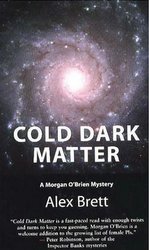
Brett’s main character is Morgan O’Brien. She’s a principal investigator based in Ottawa, Ontario and who works for the fictitious National Council of Science and Technology. The plot revolves about a death at the Canadian telescope in Hawaii coupled with a loss of important record books. O’Brien is implored by a friend to investigate, for personal reasons. The story begins in Hawaii with much of the action centring about the telescope and its ancillary buildings as well as the related personnel. After many hooks and twists in the plot, O’Brien returns to Ottawa, timed naturally to amplify the contrasts in weather. There she chases down more leads and journeys through downtown streets and the cottage country in the north of the Gatineaus. The action extends up the government chain to another fictitious unit, a civilian security force attached to the Prime Minister’s Office. From there, and after dancing through some risque steps, O’Brien pounces upon the very unexpected but plausible resolution.
It is not often that I have the pleasure of reading a book partly based in my own city of Ottawa. Because of this, I had a pleasantly warm feeling while reading the passages based on regions I frequent. More important though, I could also easily evaluate the authenticity of its contents. Given this, Alex Brett’s done great work in describing the national capital region, its weather, geography and some of its more colourful elements. Because of this, I expect similar accuracy for the surroundings in Hawaii and the FrancoCanadian telescope though I have been to neither. The sprinkles of astronomical facts and events appear equally reasonable hence lending credence to the assertion that Brett has done her homework.
Apart from the facts, the real substance of a work of fiction are the characters and the plot. Brett points out that all characters are imaginary. Its hard not to believe otherwise as, aside from the investigator, most characters have only a superficial development. We get to know of their jobs and work conditions, what their homes look life from the outside and in, but there is very little about who they are. This is particularly challenging with the guilty party, as they seem to have quite a minor role and presence, yet they wind up being the cause for all the trials and tribulations. The personality of the investigator on the other hand does come through clearly. As is perhaps typical of the genre, she imbibes an amazing amount of caffeine, pushes her body through unbelievable physical challenges and appears to be able to survive with nearly no sleep. Actually, aside from being female, there is not too much differentiating this P.I. from others of the same genre. In many ways, I preferred reading the description of her assistant, a much more complex and intriguing individual with a checkered background and a very likely challenging future.
In addition to the characters, the plot is the driver for mystery aficionados. It must be readily believable yet not entirely obvious. Here, Brett delivers. Connections and twists keep the reader guessing but not frustrated. And like any good mystery, the ending is quite unexpected though not unreasonable given the clues in the story and the setting within the book. I particularly liked seeing a focal point for the crime being technical information rather than the commonly prescribed hard currency.
For a pleasant distraction via a light murder mystery, this book is fine. The plot and main character are constantly moving. The scenes are quite busy and realistic. There’s enough suspense and distractions to keep one guessing right up to the end. One ready improvement would be to reduce the simple diction of present person, past tense. Too often sentences begin with, ‘I felt, I started, I smiled, I read…’. Because of this, the reading feels prescriptive rather than emotive. This prevented me from being fully absorbed as I felt I was reading a newspaper review rather than being a participant in the action.
A good mystery brings together believable characters in a plausible but dastardly scenario. The desire to answer whodunit should be continually fed without giving away too much. Alex Brett’s murder mystery Cold Dark Matter keeps the reader guessing while having great fun playing through observatories in Hawaii and alternate bar scenes in Ottawa. It’s just the thing to have at hand while waiting for the sun to set and the evening’s observing to begin.
Read more reviews, or purchase a copy online from Amazon.com.
Review by Mark Mortimer.
